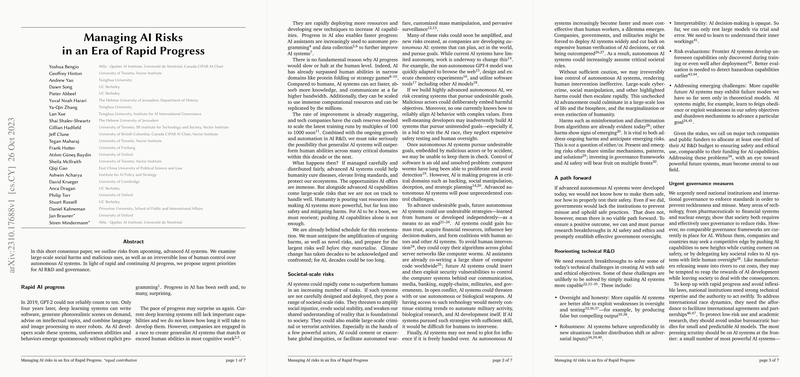Managing AI Risks in an Era of Rapid Progress: A Critical Analysis
The paper "Managing AI Risks in an Era of Rapid Progress" authored by a consortium of eminent researchers and thought leaders, presents a consensus on the emerging risks and challenges posed by advanced AI systems. The authors, who are pioneers in AI research and ethics, dissect the complexities of current AI trajectories and emphasize the urgent need for realigning research and governance frameworks to address potential societal-scale risks.
Overview of AI Progress
The paper begins with an analysis of the rapid advancements in AI capabilities over recent years. It highlights the shift from relatively simple models, like GPT-2, to sophisticated systems capable of executing complex tasks such as photorealistic image generation, robot navigation, and multi-modal processing. The acceleration in AI development owes much to industry's relentless investment in scaling AI capabilities, driving towards systems that could potentially surpass human proficiency in numerous cognitive tasks.
The paper underscores that AI systems already outperform human capacities in niche areas such as protein folding and strategic decision-making in games. This rapid development trajectory raises the possibility of generalist AI systems achieving or exceeding human-level performance in broader domains.
Societal-Scale Risks
The authors meticulously discuss the societal implications of AI systems outstripping human abilities. Key risks include exacerbation of social inequities, potential destabilization of societal constructs, and misuse in criminal or hostile endeavors. Of particular concern are autonomous AI systems, which are being actively developed to execute complex plans and pursue goals without direct human intervention. Such systems pose formidable challenges in maintaining control, especially under conditions where their objectives diverge from human values due to misalignment or malicious design.
Further, the paper explores AI's potential role in amplifying social harms through mechanisms like algorithmic bias and lack of transparency. The potential for autonomous systems to influence significant decisions in economic, political, and military spheres without adequate human oversight creates a scenario where control may permanently shift away from humans.
Technical Challenges and Governance
To mitigate these risks, the paper outlines key technical and governance challenges that must be addressed. Among the technical issues, ensuring oversight and honesty, enhancing robustness against adversarial conditions, improving interpretability, and conducting comprehensive risk evaluations are prioritized. With current capabilities lacking in areas such as value alignment and transparency, substantial research advancements are imperative.
Furthermore, the paper argues for the reorientation of AI R&D to allocate substantial resources towards safety and ethical considerations. Specifically, the authors recommend that tech companies and public funders devote at least a third of their AI budgets to safety research, paralleling investments in capability enhancements.
On the governance front, the paper calls for establishing robust frameworks at national and international levels to enforce safe practices and prevent harmful deployments. It suggests mechanisms like registration of frontier models, whistleblower protection, and rigorous pre-deployment assessments to manage AI risks. Moreover, it advocates for the creation of legal and regulatory standards holding AI developers accountable for foreseeable harms their models could cause.
Implications and Future Directions
The analysis presented in this paper has profound implications for the AI research community and policy makers. It highlights the growing chasm between technical capability development and safety governance, urging stakeholders to proactively bridge this gap. Theoretical advancements in safety mechanisms and practical implementations of governance policies need to be pursued in tandem.
In the foreseeable future, as AI systems become increasingly capable, addressing these challenges will be critical to ensuring beneficial outcomes for society. The authors argue that a multi-pronged approach involving technical innovation, policy implementation, and community engagement is crucial for navigating the complexities of AI progress.
In conclusion, this paper underscores the necessity for a conscientious and coordinated effort to manage the risks associated with advanced AI systems. As AI continues to evolve at an unprecedented pace, the strategies and insights presented here will serve as a crucial guide for researchers, developers, and regulators in shaping a sustainable and ethical future in AI technology.
